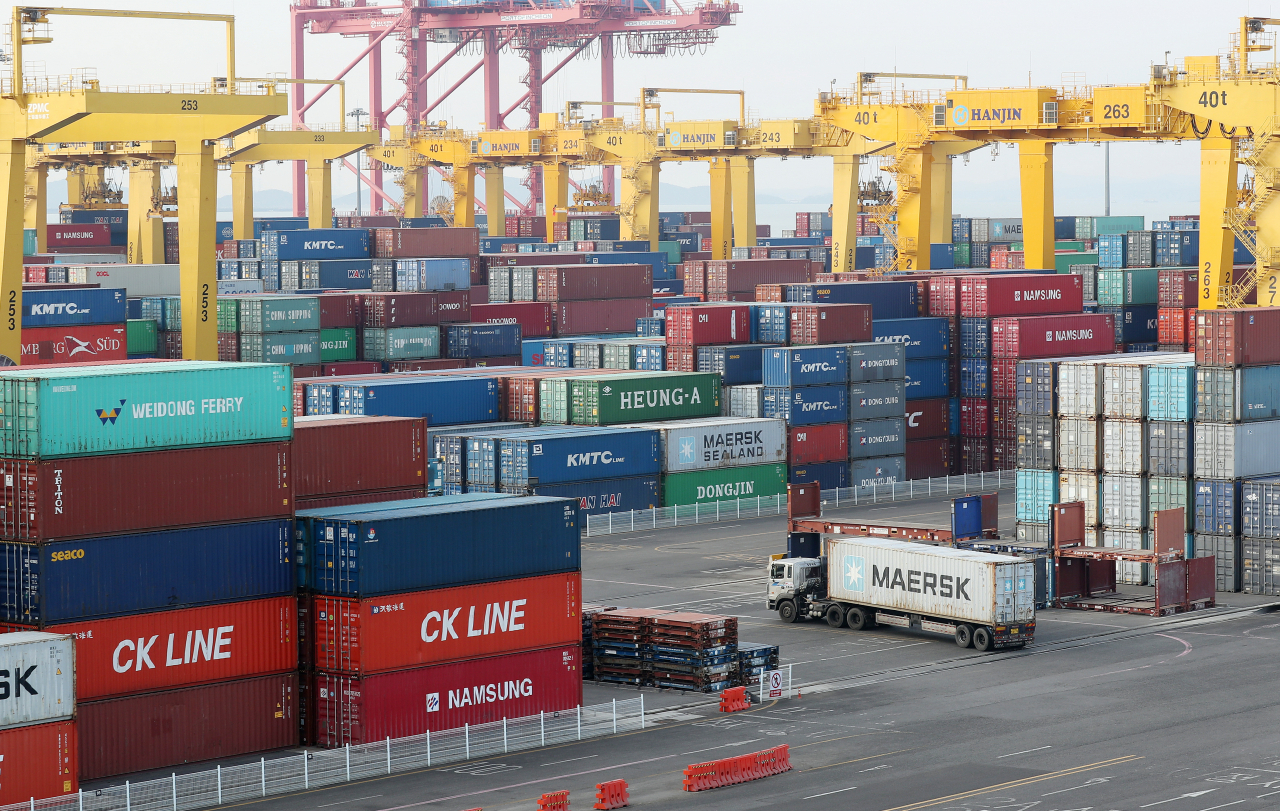
South Korea's exports rose 11.4 percent on-year in January to extend their on-year gains for a third consecutive month on the back of brisk demand for chips and cars, data showed Monday, though the global resurgence of new virus cases hindered a full-fledged recovery.
Exports came to $48 billion last month, compared with $43 billion a year earlier, according to the data compiled by the Ministry of Trade, Industry and Energy.
Imports edged up 3.1 percent to $44 billion, resulting in a trade surplus of $3.96 billion. It marked the nine consecutive month for the country to post a trade surplus.
The January figure beat market expectations. According to a poll by Yonhap Infomax, the financial arm of Yonhap News Agency, the country's January exports were expected to have risen 9.7 percent on-year.
By segment, outbound shipments of chips advanced 21.7 percent on-year to reach $8.7 billion, expanding on-year for the fifth consecutive month. Chips accounted for 18 percent of the monthly exports. The growth was attributable to rising demand from data centers.
Autos were also among major winners.
Exports of automobiles increased 40.2 percent on-year to reach $4 billion, marking the sharpest growth since September 2017, driven by strong demand for sports utility vehicles and eco-friendly models.
Shipments of mobile devices and display products shot up 58 percent and 32.3 percent over the period, respectively, on the back of the release of new smartphone models, the data showed.
With more people working from home, demand for laptops and TVs also gathered ground, leading to stronger demand for displays.
Amid the COVID-19 pandemic, exports of biohealth products, which cover virus test kits, increased 66.5 percent on-year to reach $1.28 billion.
Outbound shipments of petrochemical products rebounded 8.6 percent, marking the first growth in more than two years, on the back of stronger demand from the medical sector.
Overseas sales of petroleum products, on the other hand, plunged 46 percent due to weak oil prices.
By destination, exports to China rose 22 percent on strong performance of chips, machinery and mobile devices.
Shipments to the United States soared 46.1 percent as people purchased more cars while refraining from using public transportation amid the virus pandemic.
The two countries represented more than 40 percent of South Korea's monthly exports.
Shipments to the European Union gained 23.9 percent, led mostly by COVID-19 test kits and automobiles.
Exports to Southeast Asia, on the other hand, slipped 15.2 percent due to sluggish business sentiment there.
The ministry said the country's exports are expected to continue to recover down the road for the time being on the base effect.
"But we also face risks such as protectionism, the trade row between the United States and China, along with the COVID-19 pandemic," Na Seung-sik, deputy minister for trade and investment, said during a briefing.
In December, the monthly exports advanced 12.6 percent on-year to reach $51.4 billion. It marked the first time since November 2018 for the export volume to surpass the $50 billion mark.
South Korean exports had extended their slump to a sixth month in a row in August due to the COVID-19 fallout before rebounding in September on increased shipments of chips. In October, exports again tumbled due to a resurgence in the virus. In the following month, exports again rebounded.
Last year, the country's outbound shipments came to $512.8 billion, down 5.4 percent from 2019.
South Korea expects this year's outbound shipments to rebound 8.6 percent on-year in 2021.
The South Korean economy, Asia's fourth-largest, suffered a 1 percent retreat last year, marking the sharpest-ever contraction since the 1997 financial crisis.
The central bank expects Asia's fourth-largest economy to grow 3 percent this year on the back of the recovery of exports. (Yonhap)
Exports came to $48 billion last month, compared with $43 billion a year earlier, according to the data compiled by the Ministry of Trade, Industry and Energy.
Imports edged up 3.1 percent to $44 billion, resulting in a trade surplus of $3.96 billion. It marked the nine consecutive month for the country to post a trade surplus.
The January figure beat market expectations. According to a poll by Yonhap Infomax, the financial arm of Yonhap News Agency, the country's January exports were expected to have risen 9.7 percent on-year.
By segment, outbound shipments of chips advanced 21.7 percent on-year to reach $8.7 billion, expanding on-year for the fifth consecutive month. Chips accounted for 18 percent of the monthly exports. The growth was attributable to rising demand from data centers.
Autos were also among major winners.
Exports of automobiles increased 40.2 percent on-year to reach $4 billion, marking the sharpest growth since September 2017, driven by strong demand for sports utility vehicles and eco-friendly models.
Shipments of mobile devices and display products shot up 58 percent and 32.3 percent over the period, respectively, on the back of the release of new smartphone models, the data showed.
With more people working from home, demand for laptops and TVs also gathered ground, leading to stronger demand for displays.
Amid the COVID-19 pandemic, exports of biohealth products, which cover virus test kits, increased 66.5 percent on-year to reach $1.28 billion.
Outbound shipments of petrochemical products rebounded 8.6 percent, marking the first growth in more than two years, on the back of stronger demand from the medical sector.
Overseas sales of petroleum products, on the other hand, plunged 46 percent due to weak oil prices.
By destination, exports to China rose 22 percent on strong performance of chips, machinery and mobile devices.
Shipments to the United States soared 46.1 percent as people purchased more cars while refraining from using public transportation amid the virus pandemic.
The two countries represented more than 40 percent of South Korea's monthly exports.
Shipments to the European Union gained 23.9 percent, led mostly by COVID-19 test kits and automobiles.
Exports to Southeast Asia, on the other hand, slipped 15.2 percent due to sluggish business sentiment there.
The ministry said the country's exports are expected to continue to recover down the road for the time being on the base effect.
"But we also face risks such as protectionism, the trade row between the United States and China, along with the COVID-19 pandemic," Na Seung-sik, deputy minister for trade and investment, said during a briefing.
In December, the monthly exports advanced 12.6 percent on-year to reach $51.4 billion. It marked the first time since November 2018 for the export volume to surpass the $50 billion mark.
South Korean exports had extended their slump to a sixth month in a row in August due to the COVID-19 fallout before rebounding in September on increased shipments of chips. In October, exports again tumbled due to a resurgence in the virus. In the following month, exports again rebounded.
Last year, the country's outbound shipments came to $512.8 billion, down 5.4 percent from 2019.
South Korea expects this year's outbound shipments to rebound 8.6 percent on-year in 2021.
The South Korean economy, Asia's fourth-largest, suffered a 1 percent retreat last year, marking the sharpest-ever contraction since the 1997 financial crisis.
The central bank expects Asia's fourth-largest economy to grow 3 percent this year on the back of the recovery of exports. (Yonhap)



![[AtoZ Korean Mind] Does your job define who you are? Should it?](http://res.heraldm.com/phpwas/restmb_idxmake.php?idx=644&simg=/content/image/2024/05/06/20240506050099_0.jpg&u=)















